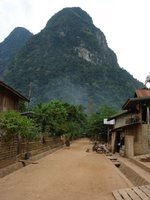 Letting go of audio privacy*
Letting go of audio privacy*Since we are effectively unemployed at the moment, people might assume we've been getting lots of regular sleep. Sadly, this is sometimes not the case. (Cue up the violin section.)
One of the challenges of traveling in the developing world, at least when staying in cheap bungalow operations as we are, is the lack of audio privacy (see note below). Even in the most quaint, remote mountain villages, quiet is a rare commodity.
Let me describe a recent stay in Muang Ngoi, by way of example.
Muang Ngoi is a tiny village up the Ou River (Nam Ou) in Northern Laos. 8 hours by slow boat from Luang Prabang, Muang Ngoi is accessible only by river. We had heard from friends and travelers alike it was "a chill little town in a beautiful spot." So, feeling somewhat intrepid, we headed upstream to check out the scene.
In Muang Ngoi, the power is supplied by diesel generator for three hours a day, 6-9pm. (As an aside, I decided to avoid meat products in this town, as I was uncertain of the quality of their refrigeration.) When the power cuts out at 9pm, the town goes to sleep. Or so it might seem.
As we settled onto our plywood mattress - seriously, but what do you expect for $5 a night - we could hear some of the locals laughing and talking as if they were in our room. Since they weren't limiting their conversations to our three words of Lao, we couldn't really be sure what they were saying, but uckily as they finished their Beerlao, they too drifted away to bed. Ahh, quiet.
But wait, the charming Kiwi from Chicago seems to snore. He was so funny during the daylight hours, but now as he obviously sleeps about 3 feet away, seperated by two milimeters of bamboo, his charm is starting to fade a bit. In go the earplugs, our constant and faithful companions.
It seemed like just moments had passed when I was jarred awake at 2am by a loud, rhythmic drumming from the wat down the road. While the monks generally announce the morning almsrounds with some somber drumming, this was more Mickey Hart than religious ceremony. After 15 minutes of vibrating the village, the monk tired of his betel nut-induced craze and wandered off to sleep.
 However, his reverie had succeeded in rousting our arch nemisis, Rooster. Known by other names in less family friendly settings, Rooster has become the bane of our rural - and even urban or town - existence. This night, the entire Rooster clan was awake and ready to call their respective locations to each other. Since the clan appeared to include thousands of members, this was no mean feat.
However, his reverie had succeeded in rousting our arch nemisis, Rooster. Known by other names in less family friendly settings, Rooster has become the bane of our rural - and even urban or town - existence. This night, the entire Rooster clan was awake and ready to call their respective locations to each other. Since the clan appeared to include thousands of members, this was no mean feat.Throughout the developing world, there are animals living with people. When we in the United States hear about avian flu, we think we can understand. But not until you see chickens, ducks, geese, turkeys and unknown other species mingling amicably with dogs, cats, children, adults, cows, goats and other sentient beings can you really get a sense of the potential for risk. For the record, we avoided intimate contact with all birds and avoided people with a noticeable hack.
And so it was in Muang Ngoi. Chickens everywhere, and more than half of them seemed to be Roosters. I have now decided that when I order chicken in restaurants, I am going to specify gender.
Once the monks had rousted one rooster, the fix was in. The first distant call, "Hey check me out," was met by one much closer, "Hey look at me." And another. And another. And on, for hours. Roosters were near and far. Some where under our bungalow. Some were in the yard out front. It got to the point where I began fantasizing about running outside in only my polypropylene boxer shorts, grabbing the nearest Rooster, and pulling its head off.
Of course, I realized I should be thanking Rooster for presenting me with such a golden opportunity to practice my patience. But then again, even the Buddha had many challenges on his path to enlightenment.
Over time, I developed an ability to tune Rooster out, and slowly drifted back to sleep.
Until 5am, when the monks were at it again. Time for more drumming to announce the almsrounds. While the music was more somber, it was equally resonant, shaking the bamboo walls around us.
Of course, the drums also signaled time for the locals to awaken, to prepare their offerings for the monks. So the town was awake, and by 6am the sounds of dishes clanking and pots banging were all around. Conversations were in full gear and longtail boats were firing up. The day had begun.
When a dogfight - the first of many to come in the day, as males sparred for access to the myriad females in heat - erupted outside our hut, we knew it was time to get up. Feeling a bit bedraggled, we arose to greet the day, finding to our delight two dogs locked together in post-coital awkwardness. Ahh, small town living.
The following night, our second and last in Muang Ngoi, these events repeated themselves. In addition, the geckos seemed more lively, making quite a racket above our heads. And I had the pleasure of waking to a cockroach drinking from the spittle at the corner of my mouth. Throwing it to the floor, I could only laugh and promise Erin, "we can upgrade when we get back to Luang Prabang."

*NOTE: We first encountered the term "Audio Privacy" when we explained to Erin's cousin Wendy about our experience in Pai, Thailand. During our stay there, the occupants of the bungalow next to ours - Asian tourists as far as we could tell from look and language - woke at 4am each day and began talking, laughing and generally carrying on at full volume with their radio blaring. Even the sight of Erin, in her stylish pajamas outside their window giving the "shh" sigh, only resulted in them pulling the shades. Wendy explained, based on her years living in multiple Asian countries, the concept of audio privacy is not part of the culture. In fact, the people in Pai probably wondered what the rude foreigner was doing invading their privacy at 4am.
No comments:
Post a Comment